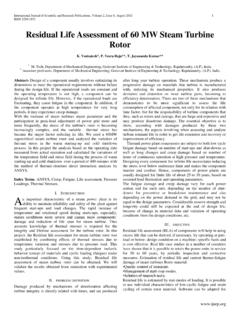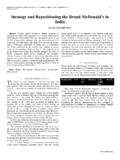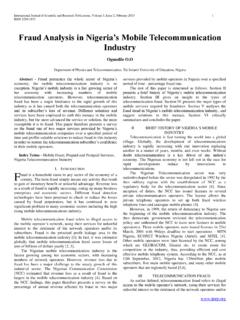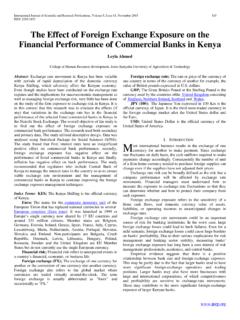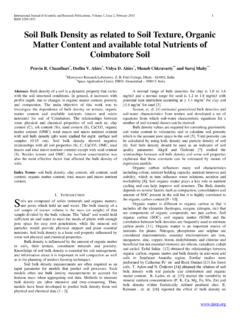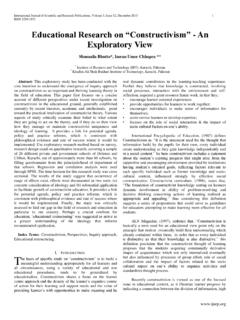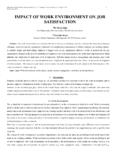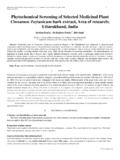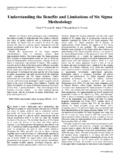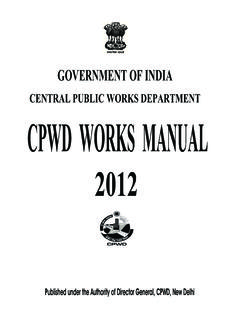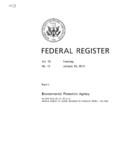Transcription of Business Ethics - IJSRP
1 International Journal of Scientific and Research Publications, Volume 2, Issue 1, January 2012 1 ISSN 2250 3153 Business Ethics Mehrdad Salehi, Mojtaba Saeidinia, Mohammadreza Aghaei Management and Science University, Malaysia Abstract- Business Ethics being part of the larger social Ethics , always been affected by the Ethics of the era. At dissimilar times of the world, people, particularly leaders of the world, were blind to Ethics and morality which were clearly unethical to the succeeding period. History of Business is tainted by and throughout the history of Slavery history of colonialism and later by the history of cold war. The current discussion of Business Ethics is the ethical discussion of the post colonialism and post world wars. The need for Business Ethics in the current era had begun gaining notice since 1970s. In the past, firms started highlighting their ethical stature since the late 1980s and early 1990s, as the world witness grave economic and natural disasters because of unethical Business practices.
2 Index Terms Business Ethics , ethical problems, and international Business Ethics I. INTRODUCTION mportance of Ethics in the Business world is superlative and global. New trends and Issues arise on a daily basis which may create an important burden to organizations and end consumers. Nowadays, the need for proper ethical behaviour within organizations has become Crucial to avoid possible lawsuits. The public scandals of corporate malfeasance and misleading practices, have affected the public perception of many organizations (e. g., Enron, Arthur Andersen, WorldCom etc.). It is widely known that advertising does not promote the advancement of human moral sensibility. Lasch s contention (1978: 1) that modern advertising Seeks to create needs, not to fulfil them: to generate new anxieties instead of allaying old ones. The recent expansion of global Business and fall of trade barriers worldwide have further Underlined the interest in the topics of ethical behaviour and social responsibility (See among Others, Jones, 1991: 366 395).
3 In addition, as many scholars believe, human rights and environmental conservation are gaining increasing more recognition in both academic and commercial settings. As multinational companies expand globally and enter foreign markets, ethical conduct of the officers and employees assume added importance since the very cultural diversity associated with such expansion may undermine the much shared cultural and ethical values observable in the more homogeneous organizations (Mahdavi, 2001). Although understanding of other cultures and recognition of differences among them will enhance the cross cultural communication, it may not be sufficient to provide viable guidelines of proper ethical behaviour in organizations. Thus, concerns about unethical behaviour of corporations in other countries, are manifested in legislations such as The Foreign Corrupt Practices Act of 1977, and the Sarbane Oxley Act of 2002.
4 In the academic arena, on the other hand, the culture based consequentiality model is developed to explain, among other things, how cultural differences alter the ethical perception and actions of individuals engaged in making decisions with ethical overtones (Robertson and Fadil, 1999: 385 392). Training sessions, codes of Journal of Academic and Business Ethics International Business Ethics , Page 3 Ethics , reward systems, and coaching are a few methods that organizations employ in this regard (Delaney and Sockell, 1992:719 727; Laczniak and Indemeden, 1987: 297 307; Jansen and Von Glinow, 1985: 814 822). Therefore, the problems that organizations face today are: How ethical values are communicated most effectively to employees? Which communication channel works best? American Business in spite of all of its faults and weaknesses, still form a key model for much of the world.
5 An important force in disseminating the American style of management is the role of the as the world s largest manufacturer of contemporary culture. Moreover, many researchers have pointed to the significant role that the American Business schools play in propagating the style of management throughout the world. (See Mahdavi, 2001; and Nimgade, 1989:104, among others) Morf (1999: 265) believes: Ethics is the moral principle that individuals inject into their decision making process and that helps temper the last outcome to conform to the norms of their society . Moreover, ethical principles have the very profound function of making behaviour predictable (Mahdavi, 2003). The truly global companies must come to grips with the legal and moral atmosphere in which they operate. But above all, they need to establish an environment that fosters ethical behaviour, because in the final analysis to do otherwise cuts into their profitability.
6 In contrast to this view a group of scholars put forth the theory of Virtuous Ethics , which is defined as a theory that focuses mainly on an individual's moral character. According to these scholars, marketing researchers have paid little attention to virtuous Ethics . Furthermore, they propose that without taking virtuous Ethics into account, a comprehensive analysis of the ethical character of marketing decision makers and their strategies cannot be attained. Research suggests that ethical or unethical behaviour in Business organizations is a function of both individual characteristics and contextual factors, and among these factors, organizational culture is one of the key influences (Meyers, 2004; Frederick, 1995; Trevino & Nelson, 2004). Research by Trevino et al. (1999) showed that in the United States (US) ethical Business organizations have, as a rule, clearly communicated Ethics guidelines or codes of Ethics .
7 They have incentive systems that are clearly tied to ethical behaviour, and promote the achievement of both economic outcomes and non I International Journal of Scientific and Research Publications, Volume 2, Issue 1, January 2012 2 ISSN 2250 3153 economic goals (Trevino & Weaver, 2001). According to Gabler (2006), employees of an ethical Business have a sense of responsibility and accountability for their actions and for the actions of others .. and freely raise issues and concerns without fear of retaliation (p. 339). In such businesses Managers model the behaviours they demand of others; and ..communicate the importance of integrity when making difficult decisions (Gabler, 2006, p. 339). But are the practices, perceived as contributing to the creation of ethical Business cultures, the same around the world? Numerous international studies of Business Ethics were conducted in the last two decades ( , Helin & Sandstorm, 2008; Robertson, Gilley, & Street, 2003; Robertson, Olson, Gilley, & Bao, 2008).
8 Some of these studies focused on the impact of cultural values on Business Ethics in companies from various countries of Asia, North America, and Europe ( , Cheung & Chan, 2005; Husted & Allen, 2008; 2003; Jackson, 2001; Jeffrey, Dilla, & Weatherholt, 2004; Pucetaite & Lamsa, 2008; Rees & Miazhevich, 2008). However, most of the extant studies focused on a limited number of practices and behaviours ( , ethical decision making or ethical leadership), and were conducted, as a rule, in a small number of countries. To our knowledge, none of the studies attempted to compare ethical Business practices in a large group of companies from a culturally and economically diverse sample of countries of the world. In this paper we explore whether Business practices, related to ethical behaviour, are similar or different in Business organizations from thirteen Centre for Ethical Business Cultures Dimensions of Ethical Business Cultures.
9 The countries in our study represent a diverse sample of cultures, levels of economic development, and socio political systems. In this exploratory study, we were not formulating and testing specific hypotheses. Rather, we were interested in finding the evidence of either convergence or divergence of ethical Business practices, and identifying specific practices which contribute the most to country (regional) differences and/or similarities. There has been a growing research interest in the area of Business and marketing Ethics . Ethics has been studied in almost all Business issues except branding. Not a single academic study has been found on branding Ethics after an extensive literature search covering the following sources: three online database (ABI Inform Global, Ebsco and Infotrac), three journals (Journal of Business Ethics , Journal of Brand Management and Journal of Product and Brand Management), dozens of books and websites.
10 Brands may have been in existence for well over a thousand years. But never has any society before seen the power of branding as is witnessed today: Brands are prevalent in every aspect of human life: production and consumption, food and clothing, personality and lifestyle; and from pop culture to politics. Branding is no longer just about adding value to a product; branding represents and promotes lifestyles and brands themselves become a kind of culture. In the words of Hazel Kahan (quoted in Hall, 1999), brands are now gunning for a share of consumers inner lives, their values, their beliefs, their politics; yes, their souls. The impact of brands and branding is far beyond the field of marketing and advertising. Branding is a social construct as well as an economic construct. As an economic construct, brands have been studied from both marketing and financial perspectives.
